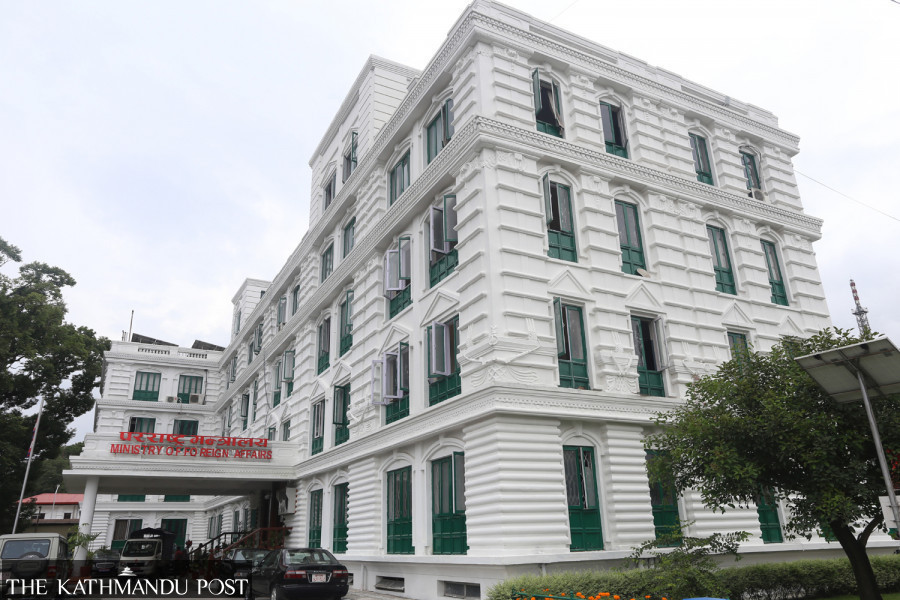National
Lipulekh: Nepal sends diplomatic notes to India, China
Lawmakers demand PM Oli raise Lipulekh strongly with neighbours during his upcoming visits.
Anil Giri
The government on Thursday sent two separate diplomatic notes to India and China on their recent understanding to reopen the trade route via Lipulekh Pass, a tri-junction territory historically belonging to Nepal.
In line with a statement issued by the Ministry of Foreign Affairs on Wednesday and several others earlier, agreements between the Nepali and Indian leaders and officials in past, as well as Nepal’s diplomatic notes to Beijing after India and China agreed to undertake trade and other business activities via Lipulekh Pass in 2015, the Ministry of Foreign Affairs sent separate diplomatic notes to the two neighbours.
During the 24th round of the Special Representatives’ dialogue on the boundary between India and China in New Delhi on Tuesday, India’s National Security Adviser Ajit Doval and China’s Foreign Minister Wang Yi agreed to reopen the three traditional border trading routes, including one that runs via Lipulekh pass.
With this decision, the Nepal government is under pressure to act immediately. The Ministry of Foreign Affairs on Wednesday reaffirmed that the official map of Nepal, as incorporated in the Constitution of Nepal, includes Limpiyadhura, Lipulekh, and Kalapani—located to the east of the Mahakali River—as integral parts of the country.
Reacting to Nepal’s statement the same night, the External Affairs Ministry of India asserted that trade through the Lipulekh Pass has been happening for decades.
“We have noted the comments of the Ministry of Foreign Affairs of Nepal related to the resumption of border trade between India and China through the Lipulekh Pass,” said Randhir Jaiswal, spokesperson for India’s Ministry of External Affairs.
“Our position in this regard has been consistent and clear. Border trade between India and China through Lipulekh pass commenced in 1954 and has been going on for decades.”
Leaders from all major political parties in Nepal have denounced the India-China understanding on the use of Nepali land for trade. Several lawmakers in the House on Thursday and Friday also raised the issue and urged the government to take up the matter with India and China without further delay—and initiate diplomatic talks to resolve the dispute.
In its note to India, the Ministry of Foreign Affairs has reiterated Nepal’s claim over the Lipulekh pass and called for dispute resolution through established diplomatic channels, two officials familiar with the developments told the Post.
Referring to the recent India-China pact and recalling past communications including those of 2015 and later, the foreign ministry said it wants to settle the matter through talks.
The foreign ministry was careful while choosing words for the Indian side as Prime Minister KP Sharma Oli is visiting India and China soon where he is expected to take up the issue with the leadership of both countries.
Oli is visiting China at the end of this month to attend the Shanghai Cooperation Organisation (SCO) summit, followed by an official visit to India on September 16.
“On boundary matters with India, we recently held two meetings which concluded on a positive note,” said a foreign ministry official. “We want to give continuity to the same spirit in the upcoming high-level engagements. Therefore, we have offered to discuss the boundary dispute at a mutually convenient date.”
Both India and China have acknowledged the notes sent by the foreign ministry.
In the note to China, the foreign ministry reaffirmed Nepal’s claim over Lipulekh pass and objected to the latest deal between India and China.
“We have urged the Chinese side to recognise Lipulekh as Nepali territory,” said the official. “We also recalled and referred to our diplomatic note sent to Beijing in 2015.”
Despite Nepal’s repeated communications asserting its claim over Lipulekh, China again reached a new agreement with India to resume trading via the three traditional points including Lipulekh.
India and China have reached several agreements on Lipulekh since 1954 but the government of Nepal has raised and opposed their decisions only on a few occasions, including in 2015.
“We have asked the Chinese side to acknowledge and recognise Lipulekh as Nepali territory as per our stated position on boundary dispute, issues and status with India and China. We made separate communications to them,” said the foreign ministry official.
In the meantime, talking to reporters, CPN-UML General Secretary Shankar Pokhrel said that the government has already sent notes to both India and China that their recent pact is unacceptable to Nepal.
“They [India and China] have ignored our sensitivities, but we want to resolve the dispute through talks and diplomacy,” he added. “Since we have already sent diplomatic notes, it is now up to them to respond.”
Though they did not consult us before signing such an agreement, the upcoming visits of the prime minister to India and China will not stop, he added.
Meanwhile, Minister for Communication and Information Technology and government spokesperson Prithvi Subba Gurung said that Lipulekh is Nepali territory and Nepal has not shifted from its stance.
Speaking at a press conference organised by Press Chautari-Kaski in Pokhara, Gurung said India has also been occupying the Nepali land in Kalapani, Darchula. He added that the issue will be resolved through diplomacy.
He said there is factual evidence proving that Lipulekh, Limpiyadhura, and Kalapani belong to Nepal.
“In the name of trade between two countries, corridors and roads cannot be built through Nepali territory. This issue has now reached the diplomatic level between the two nations,” Gurung said. “The solution should come through dialogue. We cannot imagine resolving it through a war.”
Meanwhile, members of Parliament have demanded the cancellation of the trade agreement reached by India and China. Speaking during zero hour in the National Assembly on Friday, lawmakers demanded Prime Minister Oli to strongly raise the issue during his upcoming visit to India.
Lawmakers including Ghanashyam Rijal, Padam Bahadur Bishwakarma, Manarupa Sharma, Rukmini Koirala and Renu Chand also denounced the latest deal.
Several lawmakers also raised the issue in the House of Representatives on Friday and urged the government to engage in talks with both India and China to resolve the issue.




 22.9°C Kathmandu
22.9°C Kathmandu














